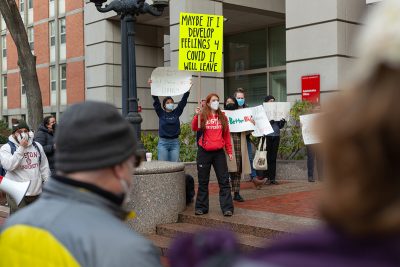
A group of Boston University School of Social Work students held a walk-out and demonstration outside the office of President Robert Brown on 1 Silber Way Tuesday in protest of the University’s COVID-19 policies.
The group, approximately 50 in number and including some faculty, could be heard chanting “be better BU” and “sick students can’t learn, sick teachers can’t teach” as they put forward their demands for the University to move to remote learning until the positivity rate of COVID-19 fell below one percent.
Protestors also called for instructors to teach remotely at their discretion and accommodations for all who test positive or are exposed to the virus.
“Some of the people who are most impacted by BU’s policies are the ones who could not be here today — because they are immunocompromised, because they can not take the risk of being here in-person, because they have caregiving responsibilities, because they are sick with COVID,” said first-year graduate student SSW Ashley Shen.
BU reported a positivity rate of 1.50% Monday. It peaked on Jan. 8 with a record high 12.69%. There is no public data on the number of students, faculty or staff in isolation or quarantine.
In an email, BU spokesperson Colin Riley said the University has all the measures in place, such as vaccine and booster mandates, to “make BU a safe place to go to class, to live and to work.”
“We understand that some are concerned,” Riley wrote. “The experts advising senior leadership at BU are monitoring all the data related to the current variant, and the operational decisions that are put in place follow their guidance.”
Alicia Murphy, a first-year graduate student in SSW and one of the protest’s organizers, said she was concerned current COVID-19 policies may have a negative impact on the health of students, staff and faculty, prompting her to take action.
“It really felt like they show a blatant disregard for the health and safety of all of our community, but especially those that are most vulnerable to disease,” Murphy said.
Jay Ward, a graduate student in SSW who also attended the protest, said the final straw for her was when BU stopped contact tracing.
“I live with elderly family members, and I work with elders in residential communities,” Ward said. “If I’m not even going to be told… I’m sitting next to someone positive, then I am unwittingly going out there and passing it on.”
A Jan. 10 statement from Chief Health Officer Judy Platt explained Healthway would not continue to perform contact tracing this semester due to “the significant number of cases” caused by the surge in the Omicron variant. Instead, students who test positive are encouraged to reach out to their close contacts themselves, she stated.
Ward said, although she does not want to return to remote learning, she believes it is important to prioritize the health and safety of everyone on campus.
“We’ve got to think of the needs of the many over the needs of the few,” Ward said. “We’ve got to think long-term, big picture. A few weeks online is not going to cause the same kind of damage as one of my patients dying.”
The protest also saw students from different BU schools and colleges attend, including Nobel Chan, a junior in the College of Arts and Sciences, who said she felt like this semester’s COVID-19 policies have been “really inadequate.”
“I feel like the administration just thinks that we’re going to classes, we’re having fun,” she said. “It’s not about fun. It’s about people’s lives and their safety.”
Chan said the protest was an opportunity to put a face to the people affected by current policies, adding she hopes BU will “at least acknowledge” their dissatisfaction.
Murphy said the protest accomplished what it set out to do.
“We had a really great turnout,” Murphy said. “We’ve gotten the notice of the people that we want to hear from, so it will be really interesting going forward to see if we hear any response from them.”
CORRECTION: A previous version of this article identified first-year graduate student Ashley Shen as a junior. The article has been updated to reflect this change.
























































































































Steve • Jan 27, 2022 at 2:48 pm
The university President doesn’t seem like he’s a big mental health guy. He seems like he just ignores it.